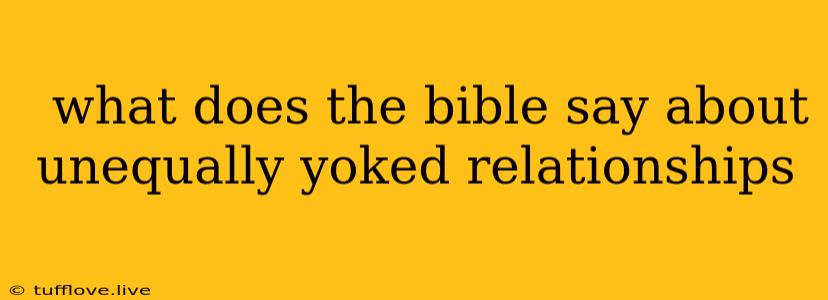The Bible, a collection of sacred texts considered holy by Christians, provides guidance on various aspects of life, including relationships. One specific passage that has sparked much discussion and debate revolves around the concept of "unequally yoked" relationships. This concept, often associated with romantic partnerships, cautions against forming unions that are mismatched in terms of faith. It is essential to understand the context and nuances of this biblical teaching to navigate the complexities of relationships in a Christian context.
Understanding the Scriptural Foundation:
The phrase "unequally yoked" originates from the book of 2 Corinthians 6:14, which states, "Do not be unequally yoked together with unbelievers. For what fellowship has righteousness with lawlessness? And what communion has light with darkness?" This verse, along with other related passages, serves as the basis for understanding the biblical perspective on relationships between believers and non-believers.
The Meaning of "Unequally Yoked"
The imagery of a yoke, a wooden bar used to connect two animals for plowing, illustrates the concept of shared responsibility and unity. In the biblical context, being "unequally yoked" signifies a partnership where one person is a follower of Christ, while the other is not. This disparity in spiritual commitment can lead to significant challenges and friction in the relationship.
The Potential Challenges of Unequally Yoked Relationships
- Spiritual Dissonance: A fundamental difference in worldview and values can create tension and a sense of spiritual disharmony. One partner may prioritize faith-based decisions, while the other prioritizes worldly pursuits, leading to disagreements and conflicts.
- Spiritual Growth: Relationships built on a shared faith can foster mutual support and encouragement in spiritual growth. However, being unequally yoked can hinder spiritual progress for the believer, as they navigate different perspectives and priorities.
- Compromise and Conflict: When one partner prioritizes faith, they may face pressure to compromise their beliefs or face opposition from their non-believing partner. This can lead to resentment, conflict, and a sense of being misunderstood.
- Family Dynamics: Differences in religious beliefs can create tensions within families, especially when children are involved. Raising children in a faith-based environment can be challenging if one parent does not share those beliefs.
Balancing Biblical Guidance with Personal Choices
While the scripture offers guidance, it's essential to acknowledge that each individual must discern how this principle applies to their own circumstances. The Bible encourages seeking God's wisdom and guidance through prayer, reflection, and fellowship with other believers.
Important Considerations
- Individual Circumstances: Each relationship is unique. Factors like the level of commitment to faith, personal beliefs, and the nature of the relationship must be carefully considered.
- Spiritual Growth: If a believer finds themselves in an unequally yoked relationship, it's crucial to continue seeking spiritual growth and guidance. This can help navigate the challenges and find a path that aligns with their faith.
- Open Communication: Honesty and open communication are crucial for any relationship, but especially for those with differing beliefs. Sharing perspectives and concerns respectfully can foster understanding and build trust.
Conclusion
The biblical principle of being "unequally yoked" serves as a cautionary reminder about the potential challenges of relationships with significant differences in faith. It is not an absolute rule, but rather a framework for thoughtful consideration and prayerful discernment. Ultimately, each individual must seek God's guidance and wisdom in making decisions that align with their faith and personal convictions.
